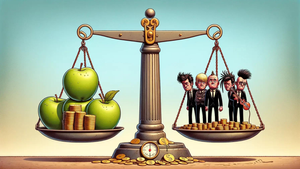After CMU broke the news that Apple Music’s new spatial audio ‘bonus’ would skew significantly in favour of the major record companies, a number of prominent independent labels have criticised the move.
In a story published in the FT this weekend, one senior exec at a large indie says, "it’s literally going to take the money out of independent labels and their artists to benefit the biggest companies in the marketplace".
Part of the reason why the new bonus for spatial available tracks will see more money allocated to the top end of the industry is that the majors simply have the resources to provide more of their catalogue in spatial audio.
Independent labels, on the other hand, the FT's source said, have "found it hard to justify the expense of creating spatial masters ... we’re not in the business of chucking money just because Apple is saying you should be spending money on this".
Apple quietly revealed to its licensing partners late last year that it was making changes to its payment model. A memo then went out last month stating that those changes were now in effect.
As a result, when Apple calculates each record label or music distributor's share of total consumption in order to allocate it a share of revenue, each play of a spatial available track now counts for 1.1 plays. A spatial available track is any recording that is delivered to Apple in spatial audio as well as a standard format. It doesn't matter which version a user listens to, the spatial available boost will still apply.
Sources who spoke to CMU said that the bonus is triggered after an Apple licensing partner reaches a one-time threshold of 50% of their streams coming from spatial available content in a month. However, CMU has not been able to establish whether this term is equally applied to all of Apple’s licensing partners or whether, for example, the threshold is lower or removed entirely for major labels.
Artists and labels unable to afford to deliver tracks - or enough of their tracks - in spatial audio will obviously lose out, because they will make less money per play under the new system. This is because the money used to pay the bonus is taken from the wider royalty pool.
Where an independent label relies on a distributor’s licensing agreement with Apple Music,, it may still lose out if its distribution partner is yet to reach the threshold, even if it delivers all its recordings in spatial audio. One independent distributor CMU spoke to said that it was “a long way” from reaching the 50% one-time trigger.
The FT reports that its sources have said that "some of the most influential independent record groups - including Beggars Group, Secretly and Partisan Records - have expressed concerns about Apple’s policy in recent days". One label told the newspaper that "the new deal will badly impact our revenues", while another noted that, for many labels, Apple is still the number two digital partner after Spotify.
Apple's changes to its payment model achieves its priority of promoting spatial audio - it wants to sell the devices and headphones people need to get the full benefit of immersive audio formats. However, by skewing things in favour of the major players, the payment model changes have a similar impact to those recently introduced by Deezer and Spotify, even if the disadvantage to independent artists is less overt.
The FT's indie label sources all spoke off the record. It remains to be seen if any labels go public. There have been public bust ups between the indies and Apple before, including when the iTunes Store first launched in the UK and when it rolled out its Apple Music streaming service, on both occasions because the indie community felt the tech giant was prioritising the interests of the majors.
In more recent years Apple has generally avoided negative comments from the music community, with Spotify feeling most of the heat, alongside the user-generated content platforms like YouTube and TikTok. But this major-friendly meddling with its payment model may put Apple Music back in the public spotlight for the wrong reasons.

